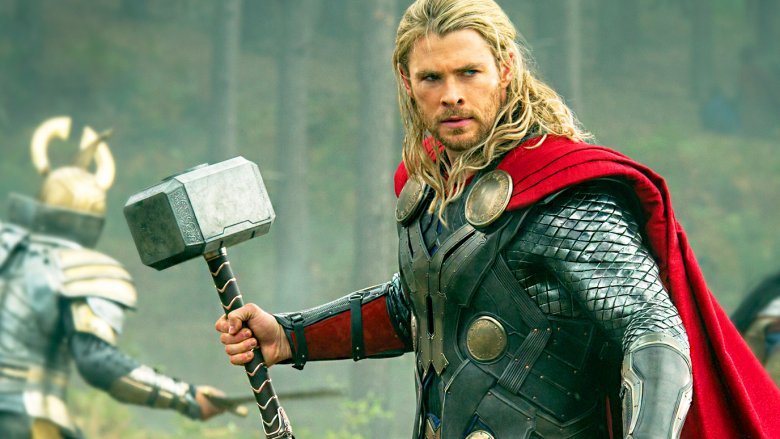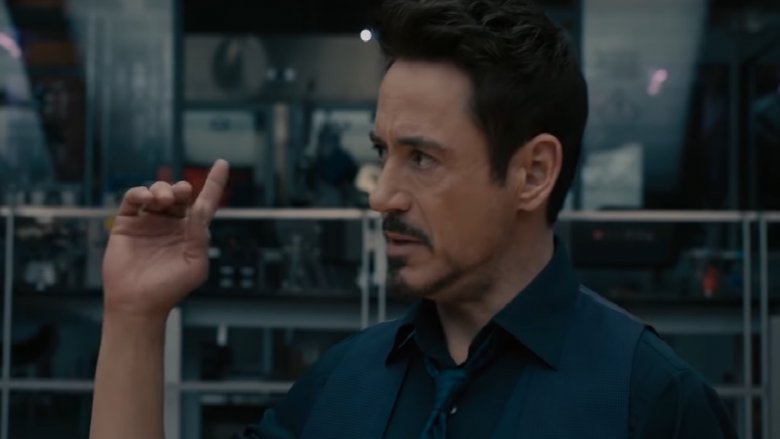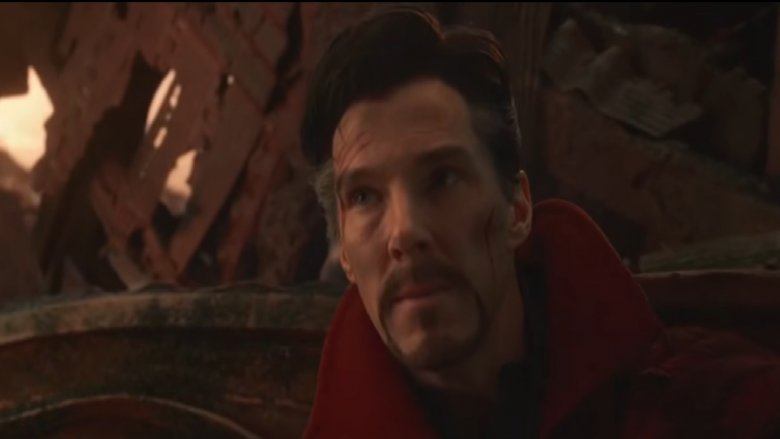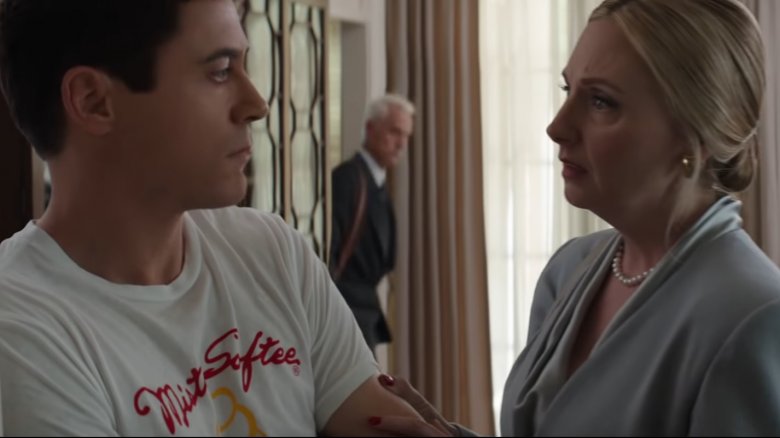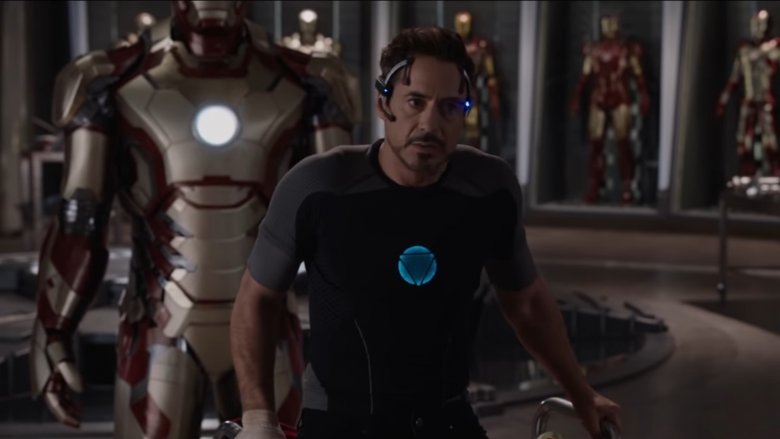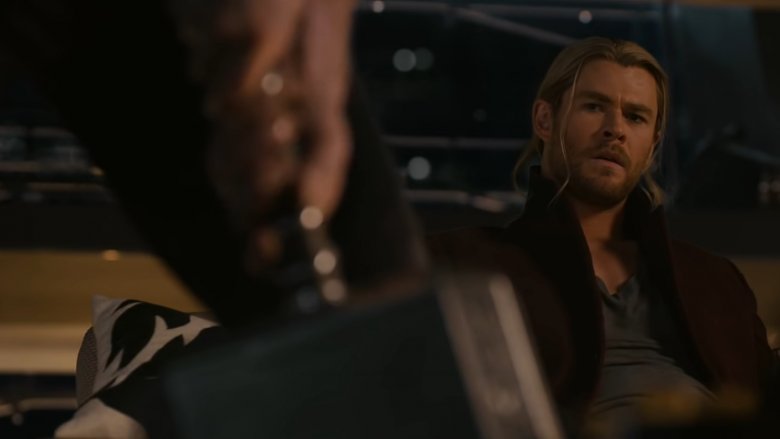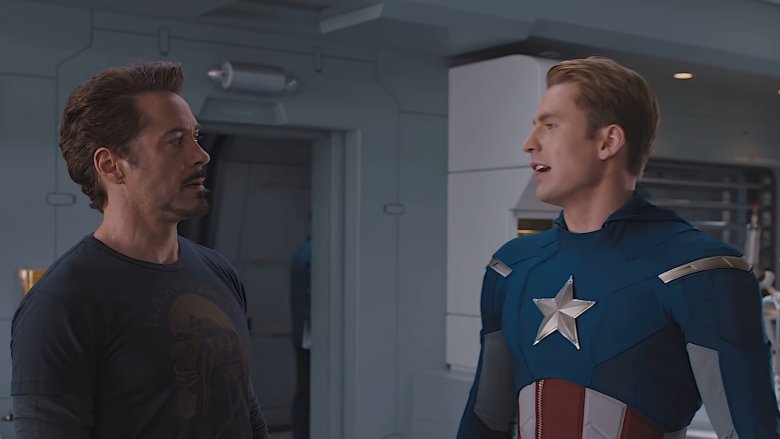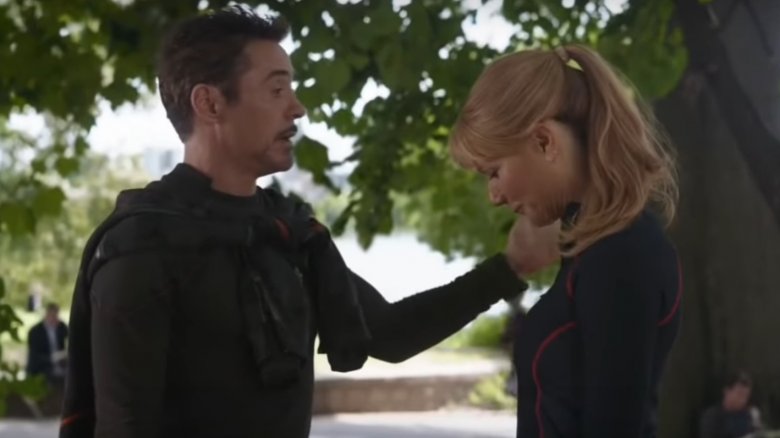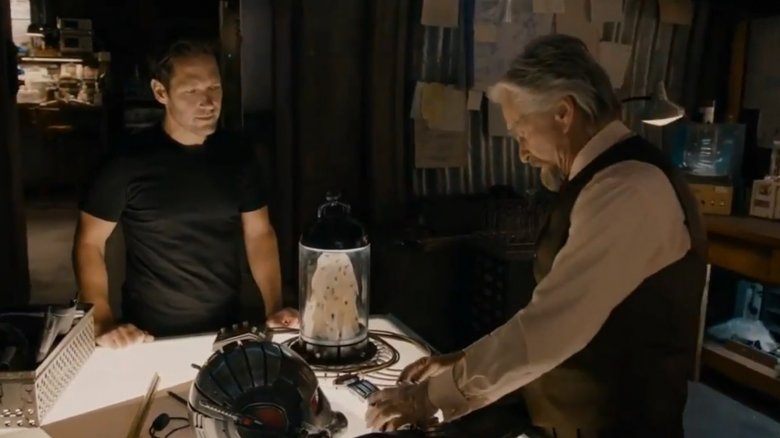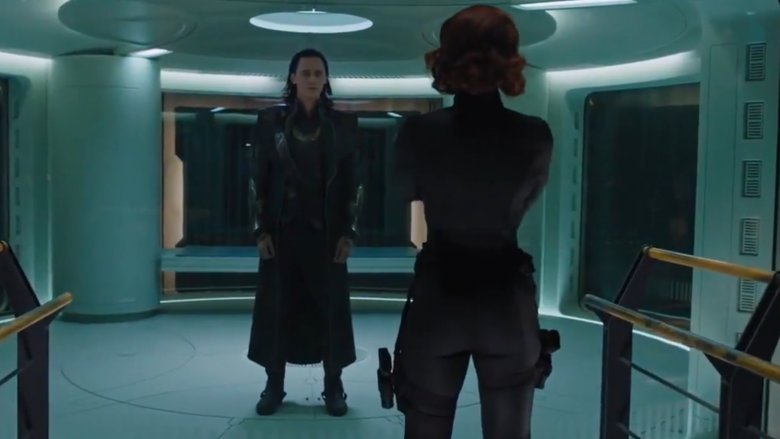Huge Details About Endgame We Missed In Other Marvel Movies
As the long-awaited climax to a franchise that's been building for over a decade across more than 20 movies (and kind of, if you squint, sometimes, some TV shows like Agents of S.H.I.E.L.D.), the run-up to Avengers: Endgame saw a lot of Marvel fans spinning their wheels trying to come up with theories as to what would happen next. As trailers came out, people drew connections between those and other Marvel movies, and now that Endgame has come to theaters, we can see how all the pieces came together.
The filmmakers behind the Marvel Cinematic Universe have proven time and time again that they know how to thread together intricate plots while setting up and paying off subtle foreshadowing. The fourth Avengers movie is no exception. The MCU was preparing us for this grand climax for years — we just didn't know it. From early title drops to ominous plot clues, here are all the ways the MCU built up to its Endgame.
We've heard the title before
The phrase "endgame" has appeared in Marvel scripts before. The very first time was in a line spoken by Tony Stark during Avengers: Age of Ultron back in 2015. During this scene, a tense situation unfolds as several of the Avengers, furious that Stark (and Bruce Banner) used Loki's staff to create Ultron, chastise Stark for playing god. Thor is so enraged by Stark's actions he even goes as far as to pick Stark up by the throat before Captain America instructs him to stand down.
In response, Tony launches into a tirade about how unprepared they are for a real threat from an alien enemy: "A hostile alien army came charging in through a hole in space... we're standing 300 feet below it. We're the Avengers. We can bust arms dealers all the live-long day, but... that, up there? That's the endgame. How were you guys planning on beating that?" Although Captain America simply responds, "Together," Stark is more right than anyone in that moment realizes. When Stark uses the phrase "endgame" while gesturing towards space, he is unwittingly foreshadowing the showdown with Thanos.
Doctor Strange knows what's coming
At one point during Avengers: Infinity War, Doctor Strange uses the Time Stone to view alternate futures and see all the possible outcomes of their upcoming battle with the Mad Titan Thanos. Despite seeing millions of different potential futures, Strange is only able to find one where the Avengers win. Once the Sorcerer Supreme knows the path to the one future scenario in which Thanos is defeated, his every move is a calculated decision to bring about that future.
After the brilliant-time looping strategy that Strange used to best Dormammu in his debut film, we know that the good doctor is an adept trickster who always has a plan. This means that when Strange willingly exchanges the Time Stone to Thanos for Stark's life in Avengers: Infinity War, he clearly has a reason for giving it up. When a devastated Tony asks why he gave in to Thanos, Strange simply answers, "We're in the endgame now." Strange's move left fans howling in their seats, but long before we saw how his decision paid off, it was obvious that handing over the Time Stone was important. More than any other Avenger in the fight against Thanos, Doctor Strange is playing the long game — and he knows exactly what's at stake.
Tony needed closure
During the press conference scene near the middle of the first Iron Man film back in 2008, Tony Stark mentions how he never got to say goodbye to his father. Losing his parents so suddenly at such a young age left a psychological scar that Tony never truly healed from. This trauma came up directly during Tony's memory scene in Captain America: Civil War. In this scene, Tony explains how he spent $611 million to clear his painful memories and create a virtual experience where he can alter his last interaction with his parents.
In the simulation, Tony's mother urges him to say goodbye to his father, telling him, "You know what's about to happen. Say something. If you don't you'll regret it." When the simulation ends, Stark reveals that is only how he wishes their last interaction had gone. Tony clearly never moved on from how he treated his father the last time he saw him, and just wanted another chance to say goodbye. However, during their time travel escapades in Endgame, Tony finally got his wish.
Pepper making sure Tony gets his rest
Throughout the Iron Man films, Pepper is always making sure Tony is getting enough sleep. In fact, each of the Iron Man films has at least one instance where Pepper reminds Tony to sleep. In the original screenplay for the first Iron Man movie, she notices Tony's bed is empty and finds him downstairs repairing his suit. When Tony tries to enlist her help, Pepper replies "Absolutely not, you should be in bed." In the second Iron Man film, Pepper tells Tony, "It's time to go to bed. It's time," after he gets out of control at his birthday party. Although Pepper doesn't realize Tony is acting out because he knows he is dying from palladium poisoning, she still urges him to rest when she sees he is off-kilter.
In Iron Man 3, Tony Stark experienced terrible insomnia due to anxiety brought on by the Battle of New York. He tries to hide it but eventually admits to Pepper that he hasn't been the same since New York: "But honey, I can't sleep. You go to bed, I come down here. I do what I know. I tinker." Stark explains that he can't rest because he knows danger is coming and needs to protect the people he cares about, namely her. After noticing this theme of restlessness that Tony grapples with throughout the Iron Man films, Pepper's final words to Tony carry even more meaning.
Cap almost lifted Mjolnir before
Back in Avengers: Age of Ultron, there was a scene where several of the Avengers attempted to lift Thor's hammer. After a few drinks, heroes like Clint Barton, Tony Stark, and Bruce Banner lightheartedly took turns at trying to pick up Mjolnir. Thor welcomed the challenge, grinning from ear to ear as Clint and Tony struggled with his hammer. Although the heroes were unable to move Mjolnir at all, the hammer actually budged ever so slightly when Steve Rogers tried to lift it.
The movement is so subtle that none of the other Avengers seem to notice it, but Thor sure does. As soon as Mjolnir budges, Thor's smirk disappears and he appears genuinely worried that Captain America will be able to lift it. After Cap gives up, Thor even laughs nervously and hurriedly says "nothing," clearly hoping no one else noticed the close call. This previous interaction is why Thor shouts "I knew it!" When Cap finally wields the hammer against Thanos in Avengers: Endgame. Thor knew that Captain America was worthy to lift Mjolnir before anyone else.
Cap and Tony's argument
When Steve and Tony got in each other's face back when the Loki's scepter was influencing the Avengers in the first film, they had a bitter exchange that foreshadowed both of their futures. Cap told Tony, "You're not the guy to make the sacrifice play," and Tony retorted, "Everything special about you came from a bottle." Both these assumptions were torn apart during the events of Endgame.
When they first met, Rogers didn't believe Tony had what it took to lay his life on the line for others, but in Avengers: Endgame, Tony sacrifices himself to save half of the life in the entire universe. Despite finally finding happiness with his wife and daughter, Tony is prepared to give it all up so others can live on to find their own happiness. Stark, on the other hand, insinuates that Rogers is only a hero because of the Super Soldier Serum he took during World War II. However, when Steve is able to lift Mjolnir during Avengers: Endgame, this means the hammer has deemed him worthy of possessing Thor's power. The fact that Captain America was considered worthy enough by Mjolnir to wield the power of a god proves that Steve Rogers is a hero even without the Super Soldier Serum.
Tony mentioned Morgan in Infinity War
Toward the start of Avengers: Infinity War, Tony mentions a dream he had to Pepper as they are walking together in Central Park: "I dreamt we had a kid. It was so real. We named him after your eccentric uncle. Uh, what was his name?" to which Pepper replies: "Morgan." Although Tony had the gender wrong in his dream, this scene foreshadowed the fact that Tony would become a father when we saw him again in Avengers: Endgame. Tony and Pepper even ended up naming his daughter Morgan, just like the dream had predicted.
Morgan Stark is a character from the Iron Man comics but, oddly enough, is neither Pepper's uncle nor her daughter with Tony. Morgan Stark is actually Tony Stark's cousin who, resenting Tony for the success of Stark Industries, continuously became involved in various plots with supervillains to defeat Iron Man. Although naming Tony Stark's adorable daughter after his nefarious cousin might seem like a strange Easter egg, it shows how much the creators of the Marvel Cinematic Universe still respect their character's humble comic book beginnings.
The rules of the Quantum Realm hinting at time travel
Back in the first Ant-Man film, Dr. Hank Pym explained how the Quantum Realm worked. During his explanation, he also happened to warn Scott to never enter the Quantum Realm because it is "a reality where all concepts of time and space become irrelevant." Although this line went relatively unnoticed at the time, this was our very first hint that time travel was actually possible in the Marvel Cinematic Universe. Even though it was ultimately Tony Stark who figured out time travel, it was Scott's grasp of the laws of the Quantum Realm that got the ball rolling.
Ant-Man and the Wasp also introduced another important concept that appears in Avengers: Endgame — quantum entanglement. During the film Scott Lang became entangled with the original Wasp, Janet van Dyne, linking the two. When Nebula travels back in time through the Quantum Realm, she becomes entangled with her past self in a similar way. This is how Thanos is able to access the memories of the future Nebula and learn about the Avengers' plan to thwart him.
Widow always wanted to clear her ledger
During the first Avengers film back in 2012, Natasha was able to manipulate Loki into revealing part of his plan by pretending to let him toy with her emotions. Although Natasha was just acting distraught to lower Loki's guard, this interaction does reveal how her dark past motivates her to redeem herself. The important part of the conversation begins when Loki asks Natasha what she wants: "I've got red in my ledger; I'd like to wipe it out." Loki retorts, "Can you? Can you wipe out that much red? Drakov's daughter? Sao Paulo? The hospital fire? Barton told me everything. Your ledger is dripping, it's gushing red, and you think saving a man no more virtuous than yourself will change anything?"
Even though Natasha knows Loki is trying to get a rise out of her, he is using pieces of her past that really do haunt her. Loki knows what gets under Black Widow's skin after peering into the mind of Clint Barton, one of her closest friends. Natasha brings up her ledger once again during Avengers: Endgame, as she and Clint are fighting over who should make the ultimate sacrifice for the Soul Stone. Despite all the good she did as an Avenger, Black Widow still never felt like she made up for the sins she committed in her past life as a Russian spy. When Natasha sacrifices herself for the Soul Stone, she is trying to atone for her past by saving the only family she ever knew.
